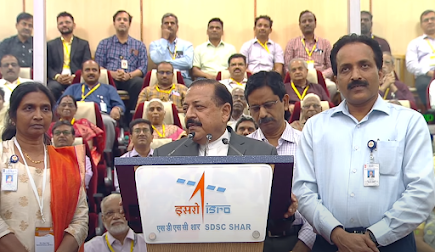Country’s First Solar Mission Aditya -L1: India Continues Its Space Journey, Says PM Modi; Sunshine Moment For India, Says Dr Jitendra Singh
New Delhi: The Prime Minister, Narendra Modi has congratulated scientists and engineers of ISRO for the successful launch of India’s first Solar Mission, Aditya -L1.
In an X post, the Prime Minister said; “After the success of Chandrayaan-3, India continues its space journey. Congratulations to our scientists and engineers at @isro for the successful launch of India’s first Solar Mission, Aditya -L1. Our tireless scientific efforts will continue in order to develop better understanding of the Universe for the welfare of entire humanity.”
Hailing the launch, President Droupadi Murmu greeted the ISRO for successfully launching the Aditya-L1 spacecraft, the first mission to study the sun.
Ms Murmu posted on X "The launch of Aditya-L1, India's first solar mission, is a landmark achievement that takes India’s indigenous space programme to a new trajectory. It will help us better understand space and celestial phenomena."
"I congratulate the scientists and engineers at @isro for this exceptional feat. My best wishes for the success of the mission," she said.
Union Minister Dr Jitendra Singh termed it as India’s “sunshine moment”.
“While the whole world watched this with baited breath, it is indeed a sunshine moment for India,” he said, addressing ISRO scientists and engineers at the Mission Control Room after the PSLV-C57 ejected Aditya L1.
Now comes the moment of fulfilling the pledge to the nation
“Indian scientists had been working, toiling day and night for years and years together. But now comes the moment of fulfilling the pledge to the nation,” said Dr Jitendra Singh.
Dr Jitendra Singh thanked the Prime Minister Narendra Modi for making this happen “by opening up new vistas for India's space sector and telling us that sky is not the limit.”
Our courage to reach out to stars and discover mysteries of universe beyond
“Thanks also honourable PM for giving us the confidence, the courage and the conviction to reach out to the stars and to discover the mysteries of universe beyond. And thanks also for making us realise the enormous potential of our space fraternity,” he said.
“Coming close on the heels of successful Chandrayaan-3 landing, the successful launch of Aditya L1 is also a testimony to the ‘whole of science and the whole of nation’ approach in which we have sought to adopt in our world culture,” said Dr Jitendra Singh.
Science institutes across the country came forward
“While ISRO is credited in executing this vision, the science institutes across the country have come forward to contribute in one form or the other, in small way or big, to this vision. To name a few, - The Indian Institute of Astrophysics, Bengaluru, the National Aerospace Laboratories, the Tata Institute of Fundamental Research, Mumbai, the NGRI Nagpur, IIT Kharagpur, IIT Madras, IIT Delhi, IIT Mumbai, and the list is too long,” Dr Singh added.
Calling it as a team effort, Dr Jitendra Singh termed the Aditya L1 launch as “a day of reckoning”.
Aditya L1 is the first space-based Indian mission to study the Sun. The spacecraft shall be placed in a halo orbit around the Lagrange point 1 (L1) of the Sun-Earth system, which is about 15 lakh km from the Earth.
Mission expected to provide crucial information
A satellite placed in the halo orbit around the L1 point has the major advantage of continuously viewing the Sun without any occultation/eclipses. This will provide a greater advantage of observing the solar activities and its effect on space weather in real time.
The Aditya L1 Mission is expected to provide the most crucial information to understand the problem of coronal heating, coronal mass ejection, pre-flare and flare activities and their characteristics, dynamics of space weather, propagation of particles and fields etc.

